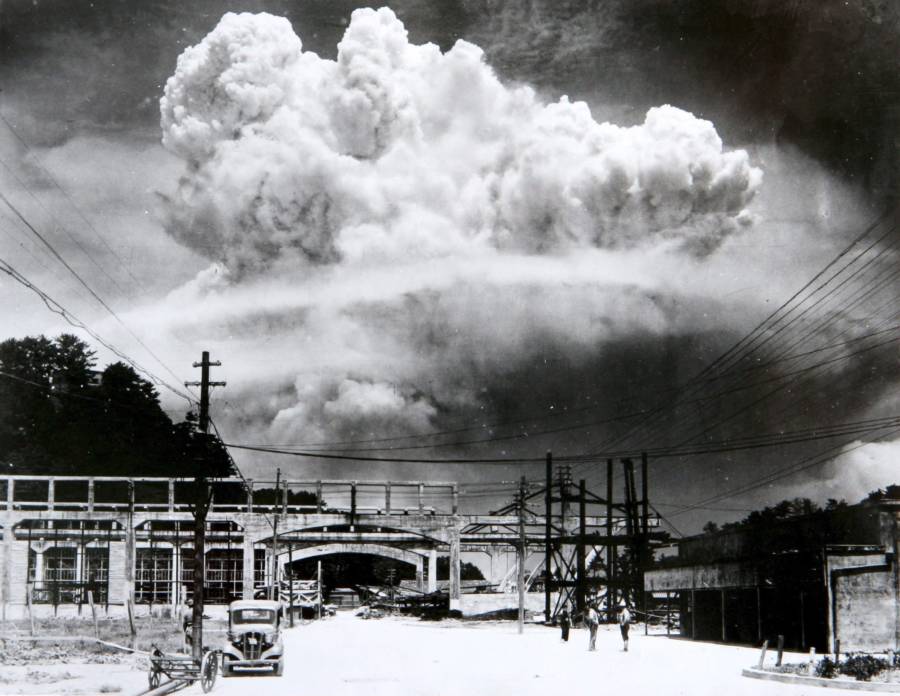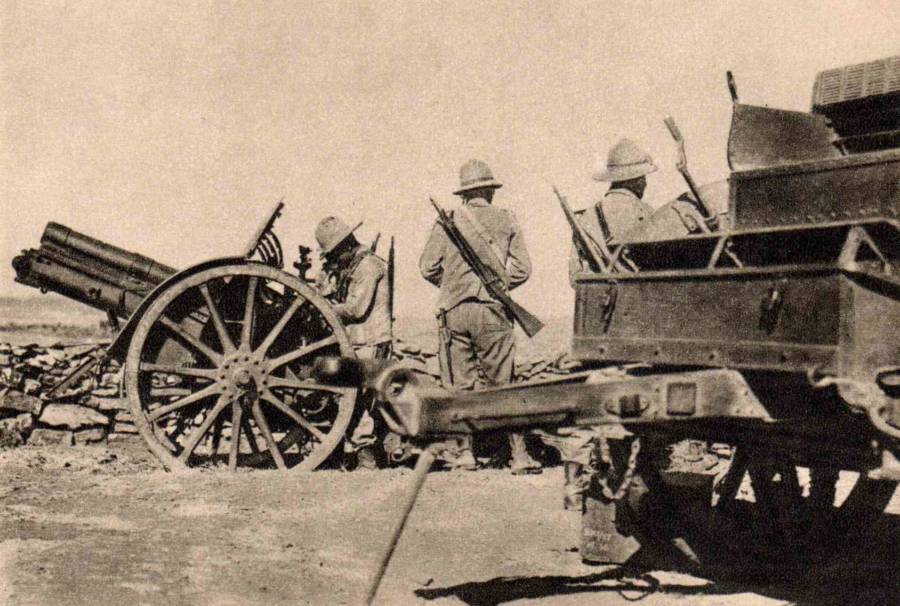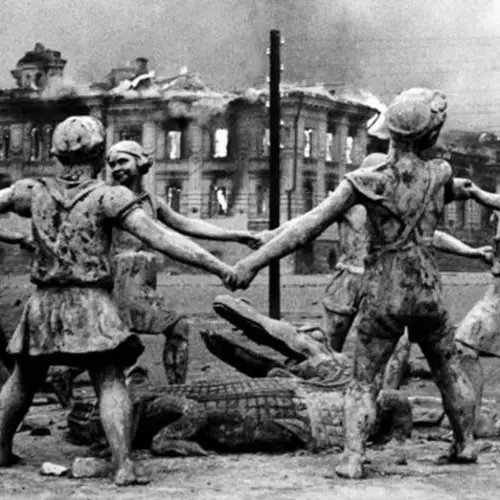From the 400,000 Axis soldiers on American shores to the real reason the Japanese surrendered, these World War II myths are sure to surprise.





















And if you liked this post, be sure to check out these popular posts:



Myth: American forces were filled with eager volunteers
However, consider the following: During World War II, two-thirds of U.S. forces were drafted, not enlisted. Yet during the Vietnam War -- the ugly, evil twin to World War II's "good war" -- two-thirds of U.S. forces were enlisted, not drafted.
Pictured: American soldiers, injured while storming Omaha Beach on D-Day, await medical treatment. Wikimedia Commons
Myth: The Holocaust's total death toll was 6 million Jews
However, that oft-quoted number says nothing of the other nearly half of the Holocaust's total death toll. In addition to the 6 million Jews, the Nazis used their death camps to exterminate a further 5 million civilians coming from many diverse groups including communists, Roma, Serbs, Polish intelligentsia, homosexuals, the disabled, and more.
Pictured: A pile of human bones and skulls sits at the Nazi concentration camp of Majdanek in the outskirts of Lublin, Poland following its liberation in 1944.AFP/Getty Images
Myth: The largest civilian death tolls were among European Jewish populations
Current estimates suggest that the civilian death toll for the Soviet Union was about 13 million and that the civilian death toll for the Chinese (at the hands of the Japanese) was about 14 million.
Pictured: Chinese corpses lie along the banks of the Qinhuai River following the Nanjing Massacre, perpetrated by the Japanese in late 1937 and early 1938. Wikimedia Commons
Myth: Axis soldiers never set foot on American soil
Dozens of American prison camps across the country housed the hundreds of thousands of prisoners that the European Allies, namely the British, simply didn't have room for.
And by all accounts, the conditions in these camps were pretty good. Prisoners were paid for their labor and provided with amenities like theater, games, and books -- it was a “golden cage,” one prisoner later said.
Pictured: German POWs board a train, bound for prison, in Boston.Wikimedia Commons
Myth: The Nazis were the only ones that committed war crimes
But far fewer people likely realize that the Allies committed their share of hideous crimes as well. There's the recent study suggesting that American soldiers raped approximately 14,000 women in England, France, and Germany as well as 10,000 in Okinawa. There's the fact that 60 percent of Japanese corpses in the Mariana Islands were missing their skulls, largely because U.S. soldiers were collecting them. And the list goes on and on and on...
Pictured: Japanese naval forces wearing gas masks prepare to advance during the battle of Shanghai in August 1937. The Japanese illegally used chemical and bacteriological weapons, including fleas carrying the bubonic plague, in many of their battles with the Chinese. Wikimedia Commons
Myth: Hiroshima and Nagasaki were the most destructive bombings of the war
On March 9 and 10, 1945, 279 U.S. bombers dropped 1,665 tons of bombs on the city, destroying 16 square miles, killing at least 100,000 and leaving another million each injured and homeless.
Pictured: Tokyo in the aftermath of the bombings.Wikimedia Commons
Myth: The atomic bombings convinced Japan to surrender
Before the atomic bombs, the U.S. had already firebombed 66 Japanese cities. "If you look at it from the perspective of the Japanese military, it doesn't really make a big difference whether people are dying from fire bombing or atomic bombs ... it is [just] two additional city centres that are destroyed," said Tokyo's Temple University director of Asian Studies Jeffery Kingston.
On the other hand, war with the Soviet Union meant that the Japanese would have to fight millions more soldiers, on a second front no less. Furthermore, before the Soviet Union invaded Japan, the two countries had a neutrality agreement, which Japan hoped would put the Soviets in a position to broker friendly armistice terms between Japan and the U.S. But with that option gone, Japan's fate was sealed.
Pictured: The atomic cloud rises over Nagasaki just after the bomb was dropped on August 9, 1945.Wikimedia Commons
Myth: The U.S. saved the day
More than any other single country, the Soviet Union is responsible for defeating the Nazis. The ratio of total military losses on the Eastern Front versus the Western Front was an astonishing nine to one, and more than 80 percent of Germany's military deaths occurred in the east.
This, of course, came at an extraordinary cost for the Soviet Union, which lost somewhere around 10 million military personnel (in addition to 13 million or so civilians). The U.S., on the other hand, lost just about 400,000 troops.
Pictured: Soviet soldiers charge during the Battle of Stalingrad in the winter of 1942-43. The battle -- lost by the Germans at a cost of 70,000 lives and 91,000 prisoners -- is widely believed to be perhaps the major turning point of the war in favor of the Allies.STF/AFP/GettyImages
Myth: American forces led D-Day
Pictured: British forces land on the beaches of Normandy on D-Day.Wikimedia Commons
Myth: It was one big war
However, the far more complicated truth is that the war was a diverse collection of both related and unrelated geopolitical conflicts that had been building for years, even decades, until enough countries had reached their breaking points that something had to be done -- a tangled morass that had finally reached critical mass.
Among these conflicts were Japan's incursions into China, Italy's incursions into Africa, border disputes between the Soviet Union and Japan, fighting between communists and anti-communists in eastern Europe and on and on and on.
And that's just the beginning...
Pictured: Clockwise from top left: Allied soldiers walk through the Egyptian desert near the battlefield at El Alamein in October, 1942; American infantrymen take position near near Amonines, Belgium on January 4, 1945; U.S. soldiers march during the Battle of Guadalcanal of late 1942 and early 1943; Allied troops move through the city of Brest, France in September 1944.Clockwise from top left: AFP/Getty Images, Wikimedia Commons, Wikimedia Commons, -/AFP/Getty Images
Myth: It wasn't really a "world" war
While the main combatants, in terms of raw numbers of troops deployed, do indeed consist mostly of the nations above, the war eventually elicited official declarations from virtually the entire world, with just a tiny handful of countries remaining neutral.
From naval action in South America to oil fields in the Middle East to land operations in north Africa to reinforcements coming up from New Zealand, no corner of the globe was off the hook.
Pictured: The German battleship Admiral Graf Spee sinks after taking fire from British cruisers on December 17, 1939 off the coast of Montevideo, Uruguay.STR/AFP/Getty Images
Myth: It started in 1939
However, many historians suggest earlier starting points including the Soviet-Japanese fighting in Mongolia in May 1939, the beginning of the Second Sino-Japanese War in 1937, the Italian invasion of Abyssinia in 1935, and even the Japanese invasion of Manchuria in 1931.
But, a war's victors are always the ones who later write its history. And so the world powers on the winning side of World War II ultimately pegged the start of the war as the moment when they got involved.
Pictured: Italian artillery in Tembien, Ethiopia (Abyssinia) in 1936.Wikimedia Commons
Myth: Pearl Harbor was a surprise sneak attack
Tensions between the U.S. and Japan had been high for well over a decade before Pearl Harbor, with the U.S. even drawing up an official war plan for action against Japan way back in 1924. Thirteen years later, the Japanese even bombed an American ship in China.
By the time negotiations began between the two countries in 1941, everyone knew things were nearing the breaking point -- even those outside of the corridors of power. A Gallup poll taken in 1941, before Pearl Harbor, showed that 52 percent of Americans expected war with Japan while just 27 percent did not.
Pictured: The USS Shaw explodes during the raid on Pearl Harbor.Wikimedia Commons
Myth: The U.S. stayed out of the war until Pearl Harbor
Furthermore, it was America's economic sanctions against Japan in 1941 that directly precipitated Pearl Harbor.
To suggest that the U.S. was sitting alone minding its own business before December 7, 1941 is simply not accurate.
Pictured: Several ships including the USS Shaw explode during the Pearl Harbor attack.Wikimedia Commons
Myth: The Nazis were duly punished for their crimes
For comparison, just 6,495 Nazi war criminals ever stood trial. And what's more, many of those who escaped did so with government help from German, South American, and even French leaders who were complicit in Nazi crimes.
Furthermore, thousands of Nazi scientists even went on to play key roles in the space race and weapons development programs for the U.S. and the Soviet Union.
Pictured: Twenty-one of the 22 Nazi leaders accused of war crimes stand trial on October 1, 1946 in Nuremberg, Germany.AFP/Getty Images
Myth: It was the first fully mechanized war
During the war, the Soviet Union employed 3.1 million horses while Germany employed 2.75 million, and also had three times more horses than vehicles when the war began.
Pictured: German SS cavalry in the Soviet Union in 1941.Wikimedia Commons
Myth: Polish soldiers on horseback stupidly charged German tanks
Not only is this not true -- the tanks only arrived after the indeed better-equipped German forces had dispatched the Poles -- but the way that the Nazi propaganda machine spun the story both informed a stereotype of Polish stupidity that reverberates to this day and singlehandedly obfuscated a Polish war contribution that involved 400,000 troops.
Polish cavalry prepare to fight invading German forces in September 1939.STF/AFP/Getty Images
Myth: France simply folded out of weakness
The retreating British forces in France, on the other hand, were simply able to escape with hundreds of thousands of troops back across the English Channel. Yet somehow Britain, as a country, didn't acquire a reputation for cowardliness -- nor should they have, just as France shouldn't have.
Pictured: Nazi leaders, including Adolf Hitler (front row, second from right), walk through Paris in the wake of the German occupation on June 23, 1940.Wikimedia Commons
Myth: The French Resistance played an important role
Moreover, as historian Robert Paxton wrote in The New York Review of Books, "It is inescapable that most resistance actions within France failed...The bottom line is that the Resistance did not change the war’s outcome. The Allies were going to win, whether the French Resistance helped them or not."
Pictured: Staged photograph of an American officer and a French Resistance fighter in France, 1944.Wikimedia Commons
Myth: Winston Churchill was a universally revered wartime hero
Among other things -- including policies that had severely underserved social welfare at home for nearly a decade -- that 1945 defeat surely had a lot to do with Churchill's irrationally hawkish mindset as the war was finally about to end.
For one, there was Churchill's appropriately named Operation Unthinkable in mid-1945. This mission, obviously never executed, would have immediately sent American, British, and, craziest of all, re-armed German forces into a full-scale invasion of the Soviet Union (whose troops outnumbered the Allies four to one).
Pictured: Winston Churchill making the victory sign for which he became widely known.OFF/AFP/Getty Images
Myth: The Western Allies pretty much consisted of the U.S., Britain, and an already defeated France
Yes, Britain and the U.S. each sustained military death totals of about 400,000. But sadly forgotten are the death totals of at least 300,000 each from Hungary, Romania, and Yugloslavia, the 240,000 from Poland, the 87,000 from India, the 3.5 million from China and on and on.
Pictured: Hungarian soldiers in the Carpathian Mountains of Eastern Europe, 1944.Wikimedia Commons




So ingrained is the widely accepted narrative of World War II that we can recount the conflict's history in a short series of mere phrases: Hitler rises, France falls, the Holocaust begins, Pearl Harbor burns, D-Day commences, the bomb drops.
However, this narrative -- even in its most fully fleshed-out form -- misrepresents why and when the war started, how and where it progressed along the way, and why and when it ended. This narrative likewise conceals both the greatest devastation committed by the war's "villains" and the greatest triumphs achieved by its "heroes."
Did you know, for example, that the war didn't begin in 1939 and didn't end because of the bomb? Did you know that Hiroshima and Nagasaki weren't even the deadliest bombings of the war, that 400,000 Axis soldiers made it onto American shores, or that the body count of the Holocaust is about twice as big as you think it is?
The facts and photos above begin to reveal the story of the war as it actually happened, not the narrative propagated by its most powerful victors after the fact. These are 21 World War II myths that desperately needed to be debunked.
Enjoy debunking these World War II myths? Next, discover 31 surprising World War II facts that even most history buffs don't know. Then, read up on ten American history myths you probably believe.





